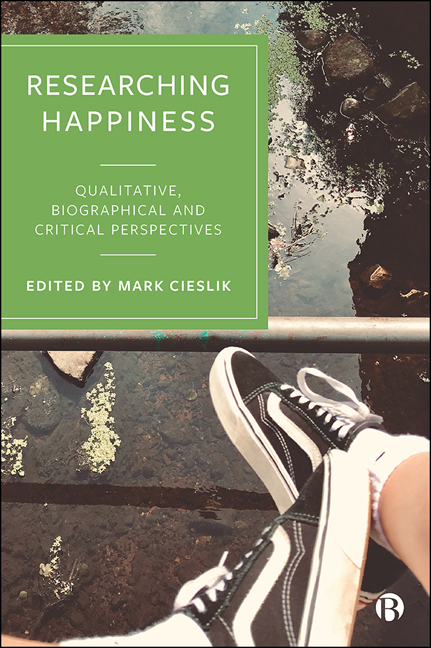Book contents
- Frontmatter
- Contents
- List of Figures and Tables
- Notes on Authors
- 1 Introduction: Developing Qualitative Research into Happiness and Wellbeing
- Part I Qualitative Research into Happiness/Wellbeing: Theories, Debates and Issues
- Part II Qualitative Research into Happiness/Wellbeing: Communities, Biographies and Identities
- Part III Qualitative Research into Happiness/Wellbeing: Methodological Innovations
- Index
5 - Developing a Biographical Approach to Happiness and Wellbeing
Published online by Cambridge University Press: 22 December 2021
- Frontmatter
- Contents
- List of Figures and Tables
- Notes on Authors
- 1 Introduction: Developing Qualitative Research into Happiness and Wellbeing
- Part I Qualitative Research into Happiness/Wellbeing: Theories, Debates and Issues
- Part II Qualitative Research into Happiness/Wellbeing: Communities, Biographies and Identities
- Part III Qualitative Research into Happiness/Wellbeing: Methodological Innovations
- Index
Summary
Introduction
I became interested in happiness studies in the early years of this century as much of the sociological research I had undertaken up to then had been concerned with the many problems people experience in modern societies – educational failure, unemployment, poverty, drug use and offending. I was keen to develop a more balanced account of everyday life as even the most troubled and disadvantaged subjects I researched spoke of their interests, hobbies and small moments of joy in their lives. Thus began an interest in researching the wellbeing of ordinary people – documenting these challenges of life that sociology traditionally explores but with a greater focus on more positive and nurturing experiences that makes life worth living. Approaching middle age, my friends were struggling with demanding careers, teenage children, health problems, failing marriages and bereavement. We were all curious about the strengths, resources and skills needed to live well during these times. We were intrigued by how much of life seems beyond our control, structured by wider social forces yet wished to understand how best to adapt to, resist and manage these influences. Can sociological research into wellbeing offer us insights into the different ways of managing life's challenges? Reviewing the research at the time suggested there were few projects that addressed these questions as many studies offered broad surveys of life satisfaction or critiqued the happiness industry and its commodification of wellbeing. I was interested to hear the voices and stories of ordinary people talking about a good life; how their differing relationships, rituals, communities and shared histories informed their wellbeing. How as people aged their wellbeing evolved with their changing relationships across their biographies creating new challenges and opportunities for a good life.
This chapter discusses some aspects of the qualitative research project I developed to study the biographies of wellbeing: the definition of happiness/wellbeing that I employed reflecting the idea of wellbeing as a collaborative practice and the methods I used to generate data by mapping the life histories of interviewees and their webs of relationships. I then discuss using concepts from Bourdieu to analyse how wellbeing is structured because of unequal opportunities and resources creating classed and gendered patterns of wellbeing.
- Type
- Chapter
- Information
- Researching HappinessQualitative, Biographical and Critical Perspectives, pp. 93 - 112Publisher: Bristol University PressPrint publication year: 2021



